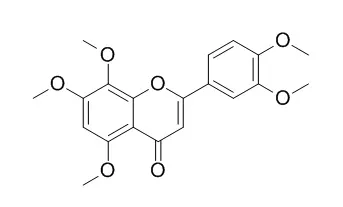Chromium(VI), a very strong oxidant, causes high cytotoxicity through oxidative stress in tissue systems.
METHODS AND RESULTS:
Our study investigated the potential ability of ethanolic Citrus aurantium L., family Rutaceae extract, used as a nutritional supplement, to alleviate lung oxidative damage induced by Cr(VI). A high-performance liquid chromatography coupled with a mass spectrometer method was developed to separate and identify flavonoids in C. aurantium L. Six flavonoids were identified, as (1) poncirin, (2) naringin, (3) naringenin, (4) quercetin, (5) Isosinensetin, and (6) tetramethyl-o-isoscutellarein. Adult Wistar rats, used in this study, were divided into six groups of six animals each: group I served as controls which received standard diet, group II received via drinking water K2Cr2O7 alone (700 ppm), groups III and IV were pretreated for 10 days with ethanol extract of C. aurantium L. at doses of 100 and 300 mg/kg body weight/day, respectively, and then K2Cr2O7 was administrated during 3 weeks, and groups V and VI received during 10 days only C. aurantium L. ethanol extract at doses of 100 and 300 mg/kg/day, respectively. Ethanol extract of C. aurantium L. was administered orally. Rats exposed to Cr(VI) showed in lung an increase in malondialdehyde and protein carbonyl levels and a decrease in sulflydryl content, glutathione, nonprotein thiol, and vitamins C and E levels. Decreases in enzyme activities such as in Na(+)K(+) ATPase, catalase, glutathione peroxidase, and superoxide dismutase were noted.
CONCLUSIONS:
Pretreatment with C. aurantium L. of chromium-treated rats ameliorated all biochemical parameters. Lung histological studies confirmed the biochemical parameters and the beneficial role of C. aurantium L. |






 Cell. 2018 Jan 11;172(1-2):249-261.e12. doi: 10.1016/j.cell.2017.12.019.IF=36.216(2019)
Cell. 2018 Jan 11;172(1-2):249-261.e12. doi: 10.1016/j.cell.2017.12.019.IF=36.216(2019) Cell Metab. 2020 Mar 3;31(3):534-548.e5. doi: 10.1016/j.cmet.2020.01.002.IF=22.415(2019)
Cell Metab. 2020 Mar 3;31(3):534-548.e5. doi: 10.1016/j.cmet.2020.01.002.IF=22.415(2019) Mol Cell. 2017 Nov 16;68(4):673-685.e6. doi: 10.1016/j.molcel.2017.10.022.IF=14.548(2019)
Mol Cell. 2017 Nov 16;68(4):673-685.e6. doi: 10.1016/j.molcel.2017.10.022.IF=14.548(2019)